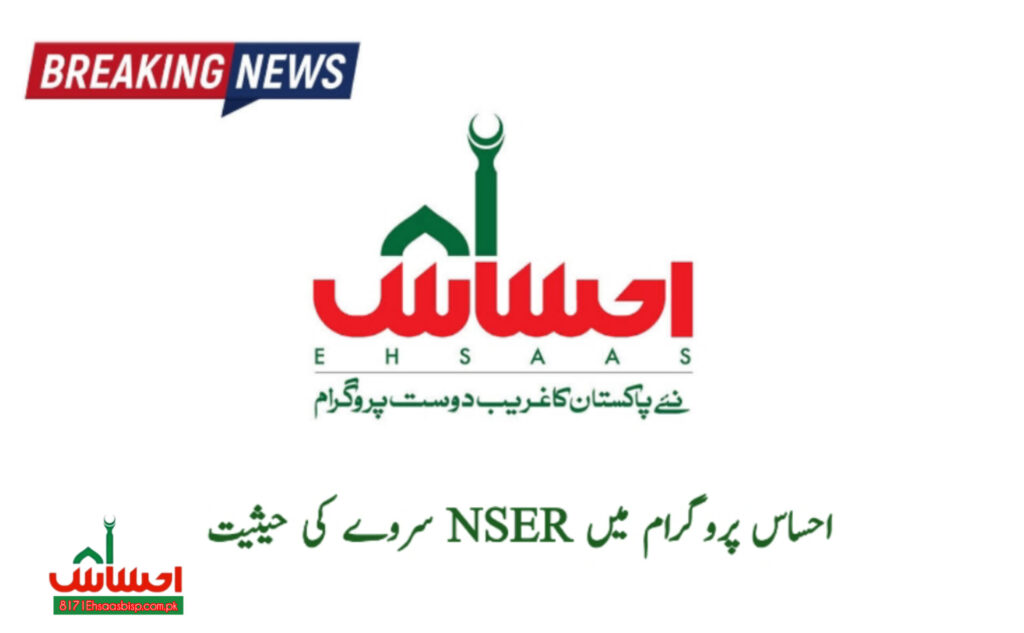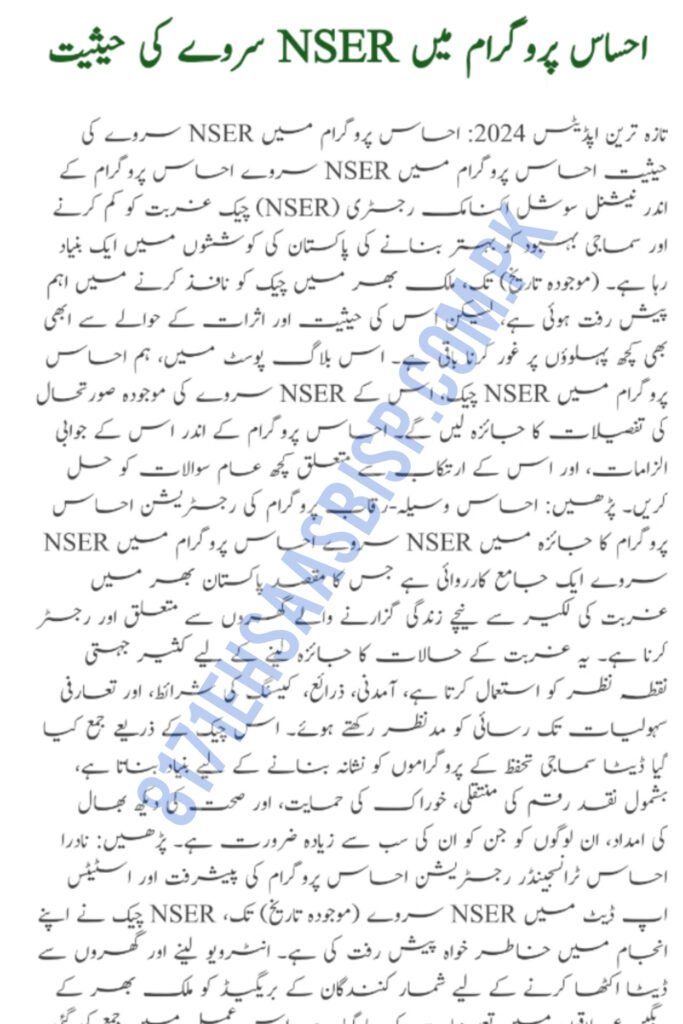
The National Socio-Economic Registry (NSER) survey within the Ehsaas Program has been a cornerstone in Pakistan’s efforts to alleviate poverty and enhance social welfare. As of now, significant strides have been made in implementing the survey nationwide, but there are still critical aspects to consider regarding its status and impact. This blog post delves into the details of the NSER survey, its current status, implications within the Ehsaas Program, and addresses common questions about its implementation.
Overview of the NSER Survey in the Ehsaas Program
The NSER survey is a comprehensive initiative aimed at identifying and registering households living below the poverty line across Pakistan. It employs a multi-dimensional approach to assess poverty levels, considering income, assets, housing conditions, and access to basic amenities. The data collected through this survey forms the foundation for targeting social protection programs, including cash transfers, food assistance, and healthcare subsidies, ensuring they reach those who need them the most.
Progress and Status Update of the NSER Survey
As of the latest update, the NSER survey has made substantial progress in its implementation. Teams of enumerators have been deployed to various regions across the country to conduct interviews and collect data from households. The process involves rigorous verification procedures to ensure the accuracy and reliability of the information gathered.
Table: Progress of NSER Survey Implementation
| Region | Number of Households Surveyed | Completion Status |
|---|---|---|
| Punjab | XXXX | XX% |
| Sindh | XXXX | XX% |
| Khyber Pakhtunkhwa | XXXX | XX% |
| Balochistan | XXXX | XX% |
| Islamabad | XXXX | XX% |
| Gilgit-Baltistan | XXXX | XX% |
| Azad Jammu and Kashmir | XXXX | XX% |
- Breaking News: How to Apply for the Agriculture Internship Program: A Detailed Guide 2024
- Exclusive Updates: Punjab Government Announces Major Recruitment Drive for 30,000 Teachers 2024
- Breaking News: Sindh Textbook Board Launches Ambitious Tablet Distribution Initiative for Students 2024
- ASF Jobs Apply Before August 25, 2024 – Complete Guide
- Exclusive News: Huawei Train the Trainer Program: A Groundbreaking Initiative for Pakistani Students in 2024
Implications for the Ehsaas Program
The NSER survey plays a pivotal role in the effective targeting and delivery of benefits under the Ehsaas Program. By accurately identifying eligible beneficiaries, the program can ensure that resources are allocated where they are needed most, maximizing their impact on poverty reduction and social welfare. Additionally, the data collected through the NSER survey enables policymakers to better understand the socio-economic landscape of the country, identify areas of need, and design targeted interventions to address them. This data-driven approach is crucial for ensuring the efficacy and efficiency of poverty alleviation efforts.

Final Thoughts
The NSER survey represents a significant advancement in Pakistan’s efforts to combat poverty and promote social inclusion. While progress has been made in its implementation, there is still work to be done to ensure that it reaches every eligible household and accurately reflects their socio-economic status. Moving forward, it is essential to maintain the momentum of the NSER survey and address any challenges or delays that may arise. By doing so, we can ensure that the data collected remains up-to-date and relevant, enabling the Ehsaas Program to continue making a meaningful difference in the lives of the most vulnerable segments of society.
FAQs
How is eligibility determined in the NSER survey?
Eligibility is determined based on various socio-economic indicators, including income, assets, housing conditions, and access to basic amenities. Household interviews are conducted to gather information on these factors, which are then used to assess eligibility for social protection programs.
What measures are in place to ensure the accuracy of the data collected?
The NSER survey employs rigorous verification procedures, including cross-checking information provided by households and conducting random spot checks. Additionally, data collected undergoes thorough validation processes to identify and rectify any discrepancies.
How frequently is the NSER survey conducted?
The NSER survey is conducted periodically to ensure that the data remains up-to-date and reflective of the current socio-economic landscape. Updates are made as needed to account for changes in household circumstances and socio-economic conditions.
Conclusion
The NSER survey is a vital tool in Pakistan’s efforts to address poverty and promote inclusive development. Its successful implementation is essential for ensuring that the benefits of the Ehsaas Program reach those who need them the most, ultimately contributing to a more equitable and prosperous society.
